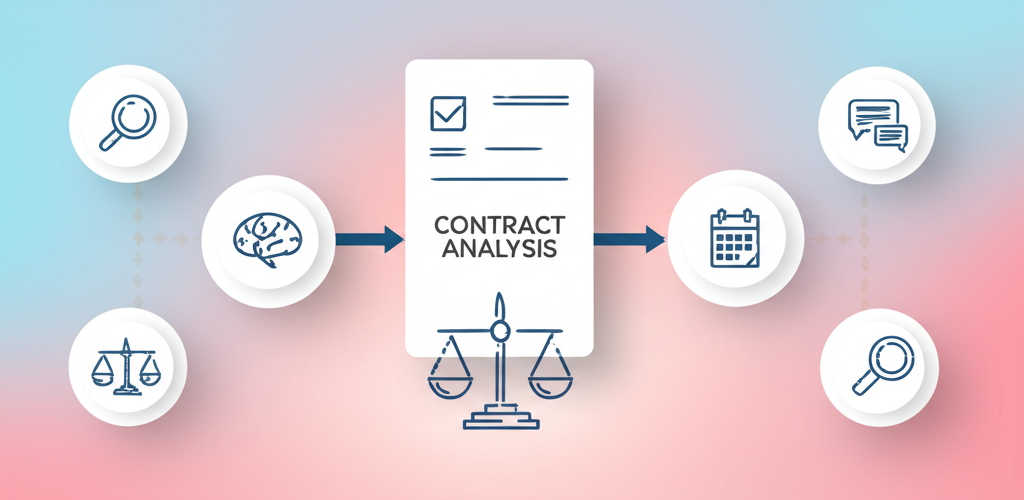Understanding the Fine Print: What to Look for in Contracts
Emma Rodriguez
Legal Content Specialist

Contracts are a part of everyday life, from employment agreements and apartment leases to terms of service for apps and websites. Yet, many people sign contracts without fully understanding what they're agreeing to. This can lead to unpleasant surprises and disputes down the road.
In this article, we'll break down the essential elements that everyone should review in any contract before signing, helping you make informed decisions and protect your interests.
1. Parties Involved and Basic Information
It might seem obvious, but first, verify that all basic information is correct:
- Names and contact information of all parties
- Dates (effective date, termination date if applicable)
- Correct spelling of names, addresses, and other identifying information
- Signatures required and their locations within the document
Errors in these fundamental details can sometimes invalidate contracts or create confusion about who is bound by the terms.
2. Scope of Services or Deliverables
Whether it's a service agreement, employment contract, or purchase agreement, the contract should clearly define:
- What is being provided or delivered
- Quality standards or expectations
- Timelines and deadlines
- What constitutes successful completion or delivery
Vague language here can lead to mismatched expectations and disputes. The more specific, the better.
3. Payment Terms and Financial Obligations
Money matters should be crystal clear:
- Amount to be paid and currency
- Payment schedule and methods
- Late payment consequences and interest rates
- Additional fees or expenses
- Rate increases and when they might occur
Hidden fees can significantly change the economics of an agreement, so pay special attention to sections about additional costs or rate adjustments.
4. Termination Clauses
Know how to exit the agreement if needed:
- Circumstances under which either party can terminate the contract
- Notice periods required for termination
- Any penalties or fees associated with early termination
- Post-termination obligations (like returning materials or maintaining confidentiality)
Being locked into an agreement with no clear exit path can be problematic if circumstances change.
5. Dispute Resolution
If things go wrong, how will disputes be resolved?
- Jurisdiction and governing law
- Whether arbitration is required (and if so, where and under what rules)
- Mediation requirements before litigation
- Who bears legal costs in case of disputes
Mandatory arbitration clauses, in particular, can significantly impact your rights and ability to seek remedies.
6. Limitation of Liability
These clauses limit how much one party can be held financially responsible for problems:
- Caps on damages
- Types of damages excluded (often consequential or indirect damages)
- Warranty disclaimers
These provisions can dramatically reduce your ability to recover damages if something goes wrong, so understand their implications.
7. Intellectual Property Rights
Who owns what that is created or shared during the agreement?
- Ownership of work products or deliverables
- License terms for using intellectual property
- Rights to modify or create derivative works
This is particularly important in creative work, consulting, and technology agreements.
8. Confidentiality and Data Privacy
Understand obligations regarding sensitive information:
- What information is considered confidential
- How long confidentiality obligations last
- Permitted uses of confidential information
- Data security and privacy requirements
9. Non-Compete and Restrictive Covenants
These provisions restrict future activities:
- Geographic scope of restrictions
- Duration of restrictions
- Specific activities that are prohibited
Non-compete clauses can significantly impact your future employment or business opportunities, so evaluate them carefully.
10. Amendments and Changes
Understand how the contract can change over time:
- Process for making amendments
- Whether changes require mutual agreement
- If one party can make unilateral changes (common in terms of service)
- Notice requirements for changes
Using AI to Help Identify Issues
With the complexity of modern contracts, tools like Contract Analyzer can help identify potential issues by automatically reviewing contract language and flagging problematic clauses or terms that might be disadvantageous.
AI-powered contract analysis can spot issues that might be easily missed in manual review, especially in lengthy documents with dense legal language.
When to Seek Professional Help
While understanding these key elements is valuable, some situations warrant professional legal advice:
- High-value contracts with significant financial implications
- Complex agreements with technical legal language
- Contracts that could significantly impact your rights or future opportunities
- When the other party is represented by legal counsel
Conclusion
Taking the time to understand the fine print before signing can save you from significant headaches later. By focusing on these key areas, you'll be better equipped to recognize potential issues and negotiate terms that protect your interests.
Remember, contracts aren't just formalities—they're legally binding agreements that define rights and obligations. The better you understand them, the more effectively you can protect yourself.
Related Articles
A handy guide to understanding common legal terms and phrases you'll encounter in contracts and agreements.
The evolution of contract review and how AI is changing the game for legal professionals and everyday users.
